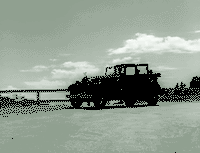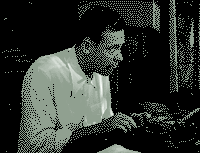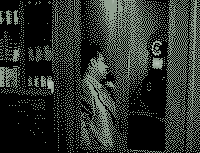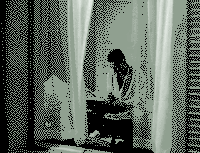April 24, 2008
Mercy: false hope
Mercy: completely forgotten
Mercy, 25, is a Kamba from south-east Kenya. Her husband was “an excessive drunk” and violent, so she left to live alone with their two children. She is sometimes forced to resort to ukahaba: “taking up with any man and going with him as long as he can feed your children for the day, or pay their school fees.” She is aware of the risk of HIV and AIDS but says this is “the reality” of being jobless.
She worries about security in Kibagare, the behaviour of young people and the rising incidence of rape, due partly to the increasing abuse of marijuana and alcohol.
Her children are her main concern and she longs for the opportunity to have some vocational training or a loan to start a business. “If…I am given a good foundation…I am convinced – without any doubt – that I could change my life and the future life of my children.”
I left Kitui (south-eastern Kenya) and came to live here in Nairobi in 1999. I am now 25.
When I got to Nairobi, I worked as a maid for a while, then I got married. My husband and I were blessed with two children, a boy and girl, but we did not stay together for long because he was an excessive drunk and he would beat me so much. So I decided to leave him and live alone with my children… When I left this man, he continued being a terrible drunkard, and he was hit by a car one day and died.
The harsh reality of unemployment
I raise these children on my own, with many problems. At first I was still working as a housemaid for a Nigerian family, but then they returned to their home. So now I depend on any casual labour I can find to feed them. Mostly I find temporary work washing clothes, but if I don’t get that I take up with a man, as I cannot watch my children die of hunger…
I live in a small room which I rent at 700 shillings a month, but it’s not easy to make the rent money… It is this situation that forces me into ukahaba, even if there are problems ¬ like diseases such as AIDS. I don’t have any other option. This practice of ukahaba means taking up with any man and going with him as long as he can feed your children for the day, or pay their school fees… I just have to do that so I can get food, rent and school fees for my children… This is the reality of not having a job.
I just pray to God that I get a good job or that as young people we get a good project, such as keeping chickens. Whatever kind of job really, so that I leave prostitution alone… Also if I could get a good man we can live together as husband and wife – that would be great.
Poverty undermines cooperation
We do not have [self-help] groups — those that exist are [older] women’s groups and their lives are much better than ours. We cannot work together because our problems [are so bad that] everybody can only be concerned with their own house. So now, even if you call a meeting it’s difficult to get enough people. Everybody follows their own path and thinks you will just waste their time — they do not see that any good results might come of it. I would like to have a group, but there are many different opinions on that.
The [only] organisation that I’ve seen helping people is the Catholic Church. It helps the very old women, especially those who have been left with their own children’s orphans. But even then it’s not all of them who are helped — just a very few.
“We have been completely forgotten”
Other private organisations or government agencies do not come here, they just get us together and take pictures and promise to return – but they do not. I don’t know if they feel that our problems are just too many, I don’t know…
Nowadays, we feel like everyone who comes here are liars and they just give us false hope…
because it seems that there are people using us for their own benefit. There are so many who have come here, taken our pictures and done things like that, but then they disappear, so we wonder where do they go? It looks like we have been completely forgotten…
We even wonder if we are wanted in this world – because of the conditions we live in, which truly are not fit for humans. And we wonder when will this situation change or will we die in this state? We also wonder if our children will also be poor like us, because they have no foundations upon which to build a future.
“Life back home is very hard”
My parents died a long time ago, even before I came to Nairobi. I started living with my sister and my elder brother, but now they both live back in Ukambani (Kitui district, south-eastern Kenya).
We last saw each other a very long time ago; I don’t go home because I lack the bus fare and [my brother] is also unable to come to Nairobi. With the little money that I earn I am just able to cover the rent and to buy food. I would very much like to go home but for now, life does not allow it.
Life back home is very hard, however, even more than here in Nairobi, because there money can scarcely be found at all. Back at home, even though education is free, parents contribute money to help provide a meal for the schoolchildren and it’s very hard to get that cash. It’s better here in Nairobi, where you can at least wash clothes for somebody and make some money.
“It was my wish…to support myself”
I went to school until Standard 8 (final class of primary school) and then there was no more money for fees… I was one of seven children and the last. I am the only child who went to school because my elder sister was married by then and she lived in Nairobi — she helped me. But there was no money to take me on to a college to acquire any skills, or to go to secondary school, even though it was my wish to get enough education to support myself in life…
I pray that I receive some help so that I can acquire some skills — even tailoring — so that I can fend for myself. I think if I get 1,000 shillings I can start training myself, even if it’s just one day a week, so that even if I am fired from being a maid I can take care of myself without relying on anyone. So that even if the maid jobs were not available I could have my own work and my children would be educated without many problems.
I would also find them a nice place to live so that they could grow up with good manners, because I will not lie to you, if I sent these children of mine to stay with you, you would not even last two days before returning them to me! Because they have no respect, they have been misled by others here in this kijiji (Swahili for village, here meaning Kibagare). I tell you, my sister, there are problems here.
“The fear that is in this community is great”
Cases [of rape] have increased greatly, especially of children who are deceived by grown-ups. Some are promised sweets and mandazi (popular semi-sweet doughnut) and such like. Rape is also on the increase because of drunkenness and drugs – also the smoking of bhang (marijuana), which has increased in the village. Now the children are seeing that it is OK to imitate these people…
I tell you, the fear that is in this community is great. I go everywhere with my daughter and I don’t know when I’ll stop doing this, because I do not know when this situation will change. There are so many problems that you just thank God when you wake up in the morning and find you are still alive [smiles].
Drug use has reduced the security situation in this kijiji… The police pass through here, but the young people know the time [they come]. So when the police are in the area, you don’t see anyone loitering about aimlessly. But just let the police leave, and they start committing the most outrageous acts [laughs].
Some even ask to be arrested because in jail nowadays there is food, not like here in Kibagare. Now when you hear somebody wants to commit a crime in order to be arrested, what can you do but leave them to it?! I think that, even if we do get help, these youths should go and have the drugs removed from their system first.
The impact of poverty on young girls
As you can see, so many girls are pregnant; almost every girl in this village has at least one child. Those girls don’t really care about their children because at night they leave them and go roaming around, looking for men in Kangemi and then in the morning they go home to sleep and leave the children [to fend for themselves].
They get pregnant when they are so young – around 12 years, sometimes younger – because their lives are hard. You know, because they have been born in such hardship this way of life attracts them, so they start making money early so that maybe they can start helping their parents. You often find they have left school and taken up a bad lifestyle; so many of them have started contracting different diseases. Many have died of AIDS.
“We live like we are not human beings”
The problem is that there are very many people and the population is increasing at a very fast rate. You see here, there are many houses which are so close together there is no space left to build toilets. Most people have to relieve themselves in polythene bags and tins, and in the morning you find those bags spread everywhere and sometimes in the river that people use for their domestic water supply. As a result, people get diseases…
We have drinking water but most people don’t have the 2 shillings you need to buy the water; many have died because of drinking dirty water.
I hear some people saying this is the government’s land; others say it is private so I don’t really know whose it is. It has become an issue that politicians use to get our votes at election time. There are times when we are threatened that the community will be demolished; other times [buildings are] burned down. We don’t really know where we stand — we just live on God’s mercy.
My request would be that the owners of these houses get the title deeds and that they build real houses. So that when we build homes too, we are sure that the houses will not be burned down or destroyed, so that we stop being afraid of losing our belongings as now. When somebody leaves their home to look for work, they are always afraid and hoping not to hear that something has happened in the village.
In my opinion, I think that if we could find somebody to buy us plots of land, and if they built houses and made toilets for us, I think life would change – so we could be like other Kenyans. You see, we live like we are not human beings. When I look at other people, they have so much money they don’t even know what to do with it, while for us, even finding food is by the grace of God. I wonder if there is really anybody thinking about us.
“I am convinced…I could change my life”
When I look at the children we have, I wonder: if our lives are this bad and have no direction or hope for the future, what will the future hold for our children? I feel like if we don’t get help from somewhere, it will get worse. But if, say, I am given a good foundation somewhere else, if I am given money to start a business, or if I received training in some vocational work, I am convinced – without any doubt – that I could change my life and the future life of my children. So that when I die, I would leave them at least some foundation from which they could rely on themselves, and be of use to future generations.
There are many businesses to undertake; the problem is getting money to start the business. For example, if I could get some money I could start to sell kale, cabbage, tomatoes. If we could get money, even a loan that we repay with a small amount of interest, I can see that would help us.
Our problem as young people is lack of employment. If it was possible for us to be given jobs, even something like rearing chickens, we would be able to create more opportunities and life would be better, as we would be busy rather than just being idle…
Guillermo Vargas
Guillermo Vargas, also known as Habacuc, (born 1975) is an artist. He caused controversy when he exhibited an emaciated dog in a gallery.
Life and work
Guillermo Vargas was born in San José.
His exhibitions include Graffiti Galería Cultura (2001), Exposición # 1 Galeria Codice Managua, Nicaragua (2002); Exorcision, Jacob Karpio Galería, San José, Costa Rica (2002); Alfombra Roja [The Red Carpet]. 300kilos de tomates (2006). He has also exhibited at the Inter-American Development Bank.
Dog exhibit
In 2007 Guillermo Vargas took a stray dog from the streets of Managua, Nicaragua, and tied it to a short leash in an art gallery, titling his exhibit “Eres Lo Que Lees” (“You Are What You Read”). Photographs appeared on the Internet showing a emaciated dog, tied to a wall by a length of rope in a room full of standing people, with the title of the exhibit written on the wall in dog food. The outrage triggered by the exhibit spawned allegations that the dog had been left to starve to death; these allegations quickly spread internationally via blogs, e-mails, and other unconfirmed sources. However, other than a three-hour period during which the dog was on display as part of Vargas’ exhibit, the gallery alleges the dog was not tied up, and was fed with food brought in by Vargas himself There are no indications in the photos of where or when they were taken, nor of who took them. Juanita Bermúdez, the director of the Códice Gallery, was quoted in La Prensa as saying that the animal was fed regularly and was only tied up for three hours on one day before it escaped. Upon conducting a probe, the Humane Society was informed that the dog was in a state of starvation when it was captured and escaped after one day of captivity; the Humane Society also acknowledged, in reference to reports that the dog had been starved to death, “the facts [had] been misconstrued in some news articles”; however, the organization also categorically condemned “the use of live animals in exhibits such as this.”
This matter was brought to the attention of the World Society for the Protection of Animals (WSPA), who investigated the issue found it had enough merit to take action, and are satisfied that no animals will be abused during the upcoming Biennial exhibition.
April 22, 2008
Drought hits millions in Thai rice region
More than 10 million people in parts of Thailand’s rice bowl region have been hit by drought, the government said Monday, causing further concerns as prices of the staple grain soar.
Thailand’s Disaster Prevention and Mitigation department reported that 55 of the kingdom’s 76 provinces were struggling with drought, mostly in the central, north and northeastern regions.
More than 151,000 rai (60,000 acres) of farmland has been affected, they said in a statement, including half of the key central rice growing provinces.
Vichien Phantodee, a member of the Thai Farmers Association, said rice farmers have been trying to exploit soaring prices and an increased global demand for the grain.
“Farmers want to plant more rice because the price is so good,” Vichien told AFP. “But the drought does affect rice production, particularly for farmland outside the irrigation areas.”
The first rice harvest of the year in Thailand, the world’s biggest rice exporter, traditionally ends in late March or early April. Farmers then let the fields recover, before planting a second harvest in May.
But as export and domestic rice prices hit record highs, many farmers are trying to plant a third crop or move their second harvest forward to take advantage of the boom.
The benchmark Thai variety, Pathumthani fragrant rice, was priced on April 9 at 956 dollars per tonne for export, up about 50 percent from a month earlier, the Thai Rice Exporters Association said in its price survey.
April 20, 2008
Suspected puffer fish poisons 140 in Thailand
More than 140 people have been rushed to hospital in northern Thailand after snacking on fish balls thought to be made from the highly poisonous puffer fish, local media reported Sunday.
Villagers in Nan province were given a soup containing the fish balls at a funeral, the Bangkok Post newspaper reported, and soon began vomiting, complaining of numbness in the tongue and shortness of breath.
After being rushed to hospital, doctors deduced that the funeral-goers had symptoms in line with puffer fish poisoning, which can be deadly, the English-language daily said. They are being kept in hospital under observation.
The fish balls were bought at a local market, the paper said, adding that meat from the toxic fish is sometimes used illegally because it is cheap.
Puffer fish is valued as a delicacy known as fugu in Japan, where chefs are specially trained to prepare it so it does not endanger diners.
The fish contains a poison known as tetrodotoxin, a neurotoxin which paralyses a person’s muscles and for which there is no antidote.
A man-made famine
There are many causes behind the world food crisis, but one chief villain: World Bank head, Robert Zoellick.
For anyone who understands the current food crisis, it is hard to listen to the head of the World Bank, Robert Zoellick, without gagging.
Earlier this week, Zoellick waxed apocalyptic about the consequences of the global surge in prices, arguing that free trade had become a humanitarian necessity, to ensure that poor people had enough to eat. The current wave of food riots has already claimed the prime minister of Haiti, and there have been protests around the world, from Mexico, to Egypt, to India.
The reason for the price rise is perfect storm of high oil prices, an increasing demand for meat in developing countries, poor harvests, population growth, financial speculation and biofuels. But prices have fluctuated before. The reason we’re seeing such misery as a result of this particular spike has everything to do with Zoellick and his friends.
Before he replaced Paul Wolfowitz at the World Bank, Zoellick was the US trade representative, their man at the World Trade Organisation. While there, he won a reputation as a tough and guileful negotiator, savvy with details and pushy with the neoconservative economic agenda: a technocrat with a knuckleduster.
His mission was to accelerate two decades of trade liberalisation in key strategic commodities for the United States, among them agriculture. Practically, this meant the removal of developing countries’ ability to stockpile grain (food mountains interfere with the market), to create tariff barriers (ditto), and to support farmers (they ought to be able to compete on their own). This Zoellick did often, and enthusiastically.
Without agricultural support policies, though, there’s no buffer between the price shocks and the bellies of the poorest people on earth. No option to support sustainable smaller-scale farmers, because they’ve been driven off their land by cheap EU and US imports. No option to dip into grain reserves because they’ve been sold off to service debt. No way of increasing the income of the poorest, because social programmes have been cut to the bone.
The reason that today’s price increases hurt the poor so much is that all protection from price shocks has been flayed away, by organisations such as the International Monetary Fund, the World Trade Organisation and the World Bank.
Even the World Bank’s own Independent Evaluation Group that the bank has been doing a poor job in agriculture. Part of the bank’s vision was to clear away the government agricultural clutter so that the private sector could come in to make agriculture efficient. But, as the Independent Evaluation Group delicately puts it, “in most reforming countries, the private sector did not step in to fill the vacuum when the public sector withdrew.” After the liberalisation of agriculture, the invisible hand was nowhere to be seen.
But governments weren’t allowed to return to the business of supporting agriculture. Trade liberalisation agreements and World Bank loan conditions, such as those promoted by Zoellick, have made food sovereignty impossible.
This is why, when we see Dominique Strauss-Kahn of the IMF wailing about food prices, or Zoellick using the crisis to argue with breathless urgency for more liberalisation, the only reasonable response is nausea.















